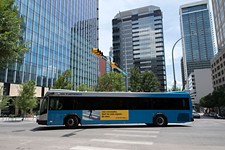Union Charges Cap Metro Subcontract Conflicts
Was cronyism involved in picking those new subcontractors?
By Josh Rosenblatt, Fri., May 11, 2012
Anyone who thought that the Cap Metro board's late April approval of two contracts for fixed-route and paratransit bus service would bring a long-awaited end to the whole Sunset Commission Review soap opera probably hasn't been paying much attention the last five years. For the bus drivers over at Amalgamated Transit Union 1091, the investigation has just begun into why Cap Metro picked McDonald Transit Associates and MV Transportation to run its fixed-route and MetroAccess bus services (respectively), to the tune of $520 million.
Currently, representatives of ATU 1091, particularly President Jay Wyatt, are focusing their attention on McDonald Transit and its connections to higher-ups in the Cap Metro organization. Their working theory – still subject to revision – goes something like this:
Cap Metro President Linda Watson, a member of the advisory council of transportation research group Texas Transportation Institute, brought in (and paid) Linda Cherrington, a research scientist with TTI, to sit on the procurement committee charged with soliciting private transportation contractors to take over Cap Metro's bus services, and to then recommend contractors to the board of directors. Cherrington and the other members of the procurement committee (all the rest of whom were Cap Metro employees) recommended McDonald Transit to take on the agency's fixed route service for nearly $409 million over seven years. The executive vice president and chief operating officer of McDonald is one John Bartosiewicz – who is not only Watson's fellow TTI Advisory Council member, but also her first boss and mentor in the transit industry, back when she was just out of graduate school and working for the Fort Worth Transportation Authority. In addition, McDonald Transit was a subconsultant on Cap Metro's 2008 CAMPO/quadrennial peer review performance audit, which presented privatization as an option for streamlining the agency's relationship with its labor force, and argued that the agency's costs were higher than those of peer cities because of the "generous" nature of its relationship with its employees. The Sunset Review Commission referenced these findings in its infamous 2010 report, and the Legislature referenced the Sunset Review Commission's report when it passed Senate Bill 650, which required Cap Metro either to privatize its bus operations or bring its bus-service employees in-house, thereby taking away employees' rights to collective bargaining and striking.
Wyatt says he believes Linda Watson was "paying Bartosiewicz back for his mentorship" by making sure his company got the lucrative fixed-route contract, and that she was doing so on the backs of organized labor. "There's too much close-knittedness between Cap Metro, TTI, and McDonald," Wyatt says. "I've never seen it happen before. Who knows how many other contracts have been done that way?"
Wyatt says that McDonald was pushing for the privatization of Cap Metro when it took part in that peer review report back in 2008, and that Cherrington was added to the procurement team to smooth the way. He also points to disputes McDonald has had with organized labor since taking over fixed-bus services in Colorado Springs, Colo., in 2011 as evidence of the company's anti-union stance (activists claim McDonald didn't honor a preexisting labor agreement and still hasn't instituted a health insurance program for employees). "It all stinks," Wyatt says.
Watson rejected Wyatt's charges, saying McDonald was chosen to take over the fixed-route buses because of its "commitment to quality, their strong communication with employees, and their strong local management team," not because of any relationship she has with one of their executives. Watson claims she had no say in either the decision to bring in TTI for the contract-procurement process, nor the decision by the procurement committee to recommend McDonald to the board.
"TTI is like the Harvard of transportation research organizations," Watson says. "They're really well-respected in terms of the credibility and reputation they have. We hired TTI, and Linda Cherrington was the project manager, to do an analysis of all the costs and pricing from the proposals. That was done independent of our staff. We didn't even have that information. She did it on her own.
"I have no influence on the work of TTI. They're looking at prices – dollars and cents and black and white – and there's not much you can do to make those numbers come out a different way."
Surely, though, Watson can understand the union's concerns, given that she's the president of a transit agency that's signing a $400 million contract with a company whose executive vice president was her mentor. Does that represent at least a potential conflict of interest?
"Transit is a small industry. All of the contractors that proposed during this process have worked with me at some point," Watson says. "But there's no conflict there. McDonald put in a bid for our bus rapid transit service, and they did not get that contract. I was here when that solicitation occurred. That's one of the reasons the board brought me in: I'm a seasoned professional with a lot of transit experience, and I've worked with a lot of vendors, management firms, and service providers. But this process was done with the utmost of professionalism and integrity. I was kept very separate from it."
Got something to say on the subject? Send a letter to the editor.













